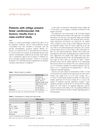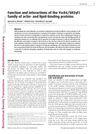 12 citations,
February 2022 in “International Journal of Clinical Practice”
12 citations,
February 2022 in “International Journal of Clinical Practice” Oxidative stress is higher in women with PCOS, especially if they're obese, and it may increase their risk of heart disease.
 10 citations,
April 2016 in “Research and reports in transdermal drug delivery”
10 citations,
April 2016 in “Research and reports in transdermal drug delivery” Transfollicular drug delivery is promising but needs more research to improve and understand it better.
 28 citations,
January 2017 in “Critical Reviews in Therapeutic Drug Carrier Systems”
28 citations,
January 2017 in “Critical Reviews in Therapeutic Drug Carrier Systems” Nanomaterials in biomedicine can improve treatments but may have risks like toxicity, needing more safety research.
 24 citations,
July 2018 in “Stem cells”
24 citations,
July 2018 in “Stem cells” Runx1 controls fat-related genes important for normal and cancer cell growth, affecting skin and hair cell behavior.
 6 citations,
August 2014 in “Toxicologic pathology”
6 citations,
August 2014 in “Toxicologic pathology” Blocking DGAT1 reduces oil gland size in mice and dogs, but only mice experience hair loss.
 5 citations,
January 2003 in “Oilseeds and fats, crops and lipids/OCL. Oilseeds & fats crops and lipids”
5 citations,
January 2003 in “Oilseeds and fats, crops and lipids/OCL. Oilseeds & fats crops and lipids” Vegetable protein lowers cholesterol and protein deficiency can cause health issues.
 252 citations,
January 2008 in “Trends in Endocrinology and Metabolism”
252 citations,
January 2008 in “Trends in Endocrinology and Metabolism” Melatonin in the skin helps protect against damage from stress and UV rays, and could be used to treat certain skin conditions.
 17 citations,
December 2011 in “Journal of the European Academy of Dermatology and Venereology”
17 citations,
December 2011 in “Journal of the European Academy of Dermatology and Venereology” People with vitiligo may have a lower risk of heart disease.
 2 citations,
April 2016 in “Más dermatología”
2 citations,
April 2016 in “Más dermatología” The supplement with Serenoa repens and Pygeum africanum significantly increased active hair growth and decreased rest phase hair in post-menopausal women with hair loss, with only mild digestive side effects.
 September 2024 in “Journal of the American Academy of Dermatology”
September 2024 in “Journal of the American Academy of Dermatology” Baricitinib 4 mg is effective and safe for treating severe alopecia areata.
 25 citations,
January 2010 in “International Journal of Pharmaceutics”
25 citations,
January 2010 in “International Journal of Pharmaceutics” Particle properties affect drug retention and release in minoxidil foams, with lipid nanoparticles having higher loading capacity.
 6 citations,
January 2015 in “Biochemical Society Transactions”
6 citations,
January 2015 in “Biochemical Society Transactions” The Ysc84/SH3yl1 protein family is important for cell movement and the process of taking in materials by interacting with actin and cell membranes.
15 citations,
February 2021 in “Frontiers in immunology” Leptin, a hormone from fat cells, affects immune responses and can influence skin diseases and hair growth.
55 citations,
January 2000 in “Cell biochemistry and function” Alopecia patients have lower antioxidants and higher lipid damage in their blood.
June 2020 in “The journal of investigative dermatology/Journal of investigative dermatology” Different diets change the fat composition in mouse skin, often reducing beneficial omega-3 fatty acids.
62 citations,
July 2013 in “American Journal of Clinical Dermatology” Alopecia areata patients have higher oxidative stress and lower antioxidant levels.
 60 citations,
July 2020 in “ACS Nano”
60 citations,
July 2020 in “ACS Nano” Using CRISPR for gene editing in the body is promising but needs better delivery methods to be more efficient and specific.
July 2020 in “Benha Journal of Applied Sciences” Young men with early hair loss and high SAA3 levels are at higher risk for heart disease.
January 2009 in “Journal of Zhengzhou University” LAIC cream can improve acne by making skin thinner and softer.
21 citations,
March 2018 in “American Journal Of Pathology” Mutations in NIPAL4 cause skin issues by disrupting lipid layers, but some improvement is seen with topical treatment.
22 citations,
July 2016 in “Cellular and Molecular Life Sciences” Genetic changes in mice help understand skin and hair disorders, aiding treatment development for acne and hair loss.
 September 2017 in “Journal of Investigative Dermatology”
September 2017 in “Journal of Investigative Dermatology” Mackerel fermented fish oil protects skin cells from damage by UVB light.
 7 citations,
March 2019 in “Journal of cosmetic dermatology”
7 citations,
March 2019 in “Journal of cosmetic dermatology” African hair has the most lipids, while Caucasian hair is more hydrated and stronger.
30 citations,
November 2005 in “The journal of investigative dermatology. Symposium proceedings/The Journal of investigative dermatology symposium proceedings” The lipid in human hair follicles acts as a barrier, similar to the skin's lipid layer.
33 citations,
February 2012 in “British Journal of Dermatology” Mutations in the p63 gene affect skin adhesion, barrier integrity, and hair growth.
 December 2024 in “Journal of Cosmetic Dermatology”
December 2024 in “Journal of Cosmetic Dermatology” ME1 and PPAR signaling may influence hair loss in androgenetic alopecia.
 15 citations,
October 2016 in “Journal of The European Academy of Dermatology and Venereology”
15 citations,
October 2016 in “Journal of The European Academy of Dermatology and Venereology” People with hair loss have worse cholesterol levels, possibly linking hair loss to heart problems.
 137 citations,
January 2000 in “Skin Pharmacology and Physiology”
137 citations,
January 2000 in “Skin Pharmacology and Physiology” The document recommends using both clinical evaluation and various measurement methods to assess skin greasiness, considering factors like temperature and hormones.
 January 2020 in “International journal of medicinal plants and natural products”
January 2020 in “International journal of medicinal plants and natural products” Ayurvedic Panchakarma therapy, Virechan, can effectively manage PCOS symptoms and improve health markers.
 7 citations,
June 2020 in “Experimental dermatology”
7 citations,
June 2020 in “Experimental dermatology” Researchers found that certain lipids, especially vitamin D3, are lower in prematurely grey hair than in pigmented hair.




















